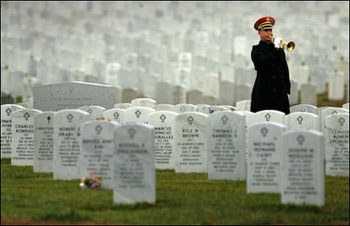A new intelligence report released on Thursday showed that the Bush administration's "surge" strategy has made progress in Iraq but the US military still faces "very tough challenges ahead," the White House said.
US soldiers are seen at sunset standing at a hill overlooking the Iraqi northern city of Kirkuk. A new intelligence report released on August 23, 2007, showed that the Bush administration's "surge" strategy has made progress in Iraq but the US military still faces "very tough challenges ahead."
"The National Intelligence Estimate's updated judgments show that our strategy has improved the security environment in Iraq but that we still face very tough challenges ahead," spokesman Gordon Johndroe said in Crawford, Texas, where President George W. Bush was vacationing.
The intelligence estimate was released by the office of the Director of National Intelligence on Thursday.
Bush was briefed on the classified version on Monday morning, Johndroe said.
Johndroe said that the intelligence estimate in February concluded that conditions in Iraq were worsening, the new estimate showed that the military's counterinsurgency strategy has begun to slow the rapidly increasing violence and patterns of the violence in Iraq.
A bugler plays Taps during the funeral at Arlington National Cemetery 16 Aug of a US soldier killed in Iraq.
Bush ordered some 30,000 additional US troops to Iraq early this year to help quell violence in Iraq. The military buildup, known as "surge," became "fully operational since mid-summer," he said.
The change was a necessary precondition to the stability and increased political reconciliation in Iraq, he said.
Judgments in the intelligence report confirmed that Iraq's security forces are improving their performance, and that bottom-up political engagement and security initiatives have made a difference and offer the best prospect for improved security over the next six to 12 months, he said.
But the report also concluded that the Iraqi security forces "have not improved enough to conduct major operations independent of the coalition on a sustained basis in multiple locations," said Johndroe.
The US intelligence community concluded that al Qaida in Iraq remained resilient, but US and Iraqi forces "have reduced al Qaida in Iraq's capabilities, restricted its freedom of movement, and denied its grassroots support in some areas," he said.
The report also confirmed that Iran and Syria were still supporting and arming militant groups inside Iraq, he said.
US soldiers from 3-509 Para-Infantry Regiment stand guard over an Iraqi family as fellow soldiers search the premises during Operation Marne Husky along the Tigris River south of Baghdad.
(Xinhua News Agency August 24, 2007)




